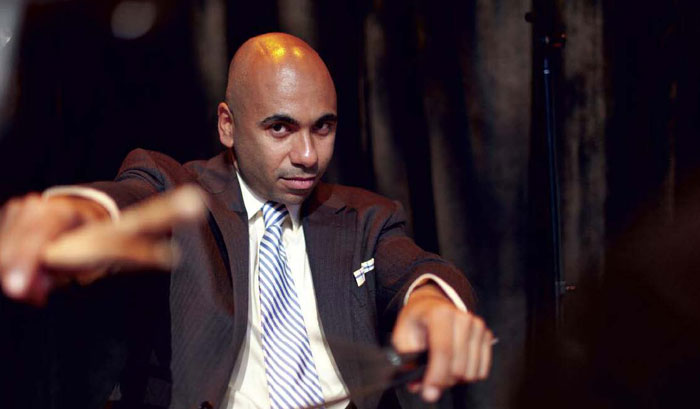


MANY HAVE CALLED JAZZ AMERICA'S GREATEST contribution to music, though jazz has rarely received the institutional support given to symphonic music, opera, and ballet. But Manhattan's Jazz at Lincoln Center organization, with its purpose-built concert venues and all-star big band directed by trumpeter Wynton Marsalis, has done much to give a great art form the respect it deserves. And the man who puts the pulse in this extraordinary ensemble is drummer Ali Jackson, Jr.
"The orchestra came about when surviving members of Duke Ellington's orchestra combined with Wynton Marsalis's septet," Jackson explained recently. "Now the group has evolved into an orchestra made up of some of the greatest soloists and improvisers of our time, combined with some of our best arrangers and writers. Not only do we play the classic music of Ellington, Count Basie, Fletcher Henderson, Benny Goodman, Stan Kenton, and Charles Mingus, but also new music by the composers in the orchestra as well as outside works that we commission. It's pretty amazing!"

Jackson is a relatively young musician, but he has many connections to classic jazz. His father, bassist Ali Jackson, played and recorded with saxophonist John Coltrane and trumpeter Wilbur Harden. The younger Ali's pianist mother was another key influence, as was his father's brother, drummer Oliver Jackson, a great swing player who worked with Earl Hines, Benny Goodman, Lionel Hampton, Oscar Peterson, and other giants.
Jackson literally cannot remember a time when he didn't play drums. "I started at age two or three," he says. "My uncle Oliver gave me my first real kit when I was nine. He'd played a big concert in Detroit, where I grew up, and donated the kit to me afterwards. I still have it and play it from time to time."
Thanks to his family connections and precocious talent, Ali was mentored by several drum greats. "I met Max Roach for the first time when I was eight, during a soundcheck. He allowed me to hang out with him onstage and showed me how he tuned his drums." Ali later studied with hard-bop stalwart Roy Brooks, who worked with Horace Silver and Archie Shepp.
Jackson was gigging professionally by the time he hit his teens. Between his varied jazz influences and his experiences playing funk and African music, he soon cultivated the seemingly effortless versatility that remains one of his trademarks. "Luckily, I had a little moustache back then," he chuckles. "People thought I was older than I was."
Upon graduating high school, Jackson was offered multiple music scholarships. He opted to attend New York's New School for Jazz and Contemporary Music so he could tap into the city's vibrant jazz scene. "That's where all the heavies are," he says. "You have to be around greatness to know what greatness actually looks like. I still aspire to be around the best people who have dedicated their lives to music."
Jackson has been a Yamaha drum endorser since 2000, when he lived briefly in Japan. "The late, great Elvin Jones was playing in town for a week," Ali recalls. "Elvin was like an uncle to me-he and my father were good friends. During his run there, Elvin made a point of introducing me to Hagi [Takashi Hagiwara, the longtime chief of Yamaha's drum division]. 'You need to sign this guy,' he said. 'He's the future of drums.' Hagi took us out to lunch, and that's how the relationship started."
These days Jackson plays a five-piece Absolute Maple series with a natural wood finish, though he sometimes reduces the kit to as few as three pieces. He inclines toward vintage-style wood hoops, though for touring he often chooses modern aluminum ones because of their stability. "I'd even use calf-skin heads if I could," he says, "but that would be crazy trying to deal with them, given our touring schedule." Ali's current favorite snare, an older 5-½" bamboo model, does have vintage hoops. "I like the color of the bamboo sound," he says. "It's got this nice little rasp in the attack."
"I've played every drum out there," says Ali. "There are some great independent drum makers, but I can always get my sound out of Yamaha drums. They're incredibly consistent, even the supposedly lower-level kits. I can still get a great sound out those instruments."
I can always get my sound out of Yamaha drums. They're incredibly consistent.
Jackson isn't necessarily opposed to mixing music and technology. (In fact, there's an entertaining video of him playing electronic drums using a Wii controller on his website, www.alidrums.com, along with some fabulous concert footage). But he worries that the simple humanity of real-time drumming is at risk when young people grow up hearing only drum machines and beat loops.
"It's a symptom of our cultural malaise that we're losing the concept of musicians playing together," he observes. "That's a very special thing. When you're blessed, as I am, to be in an environment of creating music with people who are really tuned-in and trained, there's nothing else like it. Music is a blueprint of who we are. It's our responsibility to maintain such an important part of what makes us human."
(Photography Credit: Jason Roberts)
























